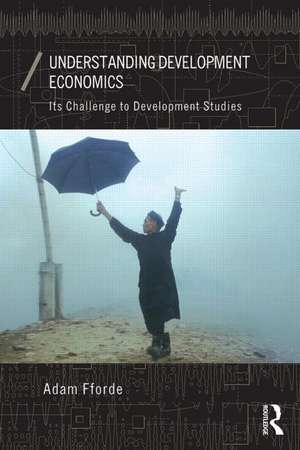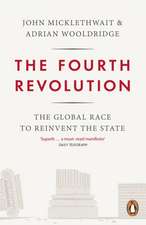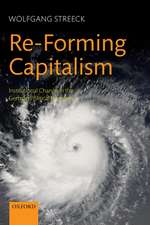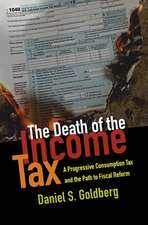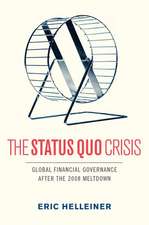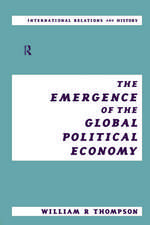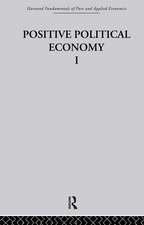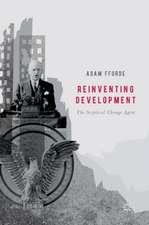Understanding Development Economics: Its Challenge to Development Studies
Autor Adam Ffordeen Limba Engleză Paperback – 13 dec 2013
The aim of this book is to show how the two disciplines have interacted, as well as how they differ. This is crucial in forming an understanding of development work, and to thinking about why policy recommendations can often lead to severe and continuing problems in developing countries.
This book introduces Development Economics to those coming from two different but linked perspectives; economists and students of development who are not economists. In both explaining and critiquing Development Economics, the book is able to suggest the implications of these findings for Development Studies, and more broadly, for development policy and its outcomes.
| Toate formatele și edițiile | Preț | Express |
|---|---|---|
| Paperback (1) | 354.65 lei 43-57 zile | |
| Taylor & Francis – 13 dec 2013 | 354.65 lei 43-57 zile | |
| Hardback (1) | 1018.82 lei 43-57 zile | |
| Taylor & Francis – 10 dec 2013 | 1018.82 lei 43-57 zile |
Preț: 354.65 lei
Preț vechi: 478.17 lei
-26% Nou
Puncte Express: 532
Preț estimativ în valută:
67.88€ • 73.76$ • 57.06£
67.88€ • 73.76$ • 57.06£
Carte tipărită la comandă
Livrare economică 21 aprilie-05 mai
Preluare comenzi: 021 569.72.76
Specificații
ISBN-13: 9780415869829
ISBN-10: 041586982X
Pagini: 384
Ilustrații: 20 black & white illustrations, 20 black & white tables
Dimensiuni: 156 x 234 x 23 mm
Greutate: 0.54 kg
Ediția:New.
Editura: Taylor & Francis
Colecția Routledge
Locul publicării:Oxford, United Kingdom
ISBN-10: 041586982X
Pagini: 384
Ilustrații: 20 black & white illustrations, 20 black & white tables
Dimensiuni: 156 x 234 x 23 mm
Greutate: 0.54 kg
Ediția:New.
Editura: Taylor & Francis
Colecția Routledge
Locul publicării:Oxford, United Kingdom
Public țintă
Postgraduate and UndergraduateCuprins
Part 1: Development Economics: Theory and its Application 1. Ways to Cope with Development Economics 2. Evidence and Positions 3. Interdisciplinary Boundaries: the Limits of Economics 4. Development Economics 5. Toward Better Management of Understanding 6. Coping with Facts 7. Established Theories of Economic Growth Part One 8. Established Theories of Economic Growth Part Two 9. Micro-foundations 10. Contemporary Internal Radicalism 11. Alternative Economic Theories 12. Other Visions of the Developing Economy 13. More Visions of the Developing Economy 14. Determinants of Economic Policy in Developing Countries 15. Policy Debacles and their Legacy Part Two: Topics and Issues 16. Poverty, Inequality and Accounts 17. The Economics of Factor Markets in Economic Development 18. Development Dogmas and their Histories 19. Import Substituting Industrialization Revisited 20. Globalization and Economic Development: Some Histories 21. Why East Asia? 22. Experimental economics, the problem of empirics, and the challenge to development studies 23. Conclusions
Notă biografică
Adam Fforde is a part-time Professorial Fellow at the Centre for Strategic Economic Studies, Victoria University, Australia, and he holds an honorary position at the Asia Institute of the University of Melbourne, Australia.
Recenzii
'By exploring the often tetchy and conflict-ridden boundaries between 'pure' economics and development practice, this book sheds important light on the strengths and weaknesses of each, and should help both sides understand and learn better from each other.' — Duncan Green, Oxfam
‘Adam Fforde is a long-standing sceptic when it comes to development economics, and in the wake of the global economic crisis he has written an important book that not only challenges the orthodoxies of development economics but also shows what development studies can learn by challenging the orthodoxies of development economics. Students of development economics and development studies will both benefit from engaging with the central arguments of Understanding Development Economics. It is a book that deserves to be widely read.’ — Haroon Akram-Lodhi, Trent University, Canada
‘Don’t be deceived by appearances: not only is this a comprehensive, scholarly, and practical textbook, it’s also a rapprochement between the disciplines of development economics and development studies. These two approaches to development are too often separated ideologically, epistemologically and methodologically. Fforde’s informed mediation is both timely and welcome. A ‘must read’ for undergraduates, postgraduates and professional scholars with an interest in international development. Prepare to be challenged!’ —Peter Case, James Cook University, Australia
"Understanding Development Economics is a valuable contribution to some of the perennial controversies that continue to inform its practitioners." — Bill Lucarellia, University of Western Sydney, Australia
"It is a sceptical examination of development economics and its epistemological and normative underpinnings from a trained economist, written for economists and development studies readers. It is also a book that, while focused on development economics, in various places gives a sense of how (at least some) development studies academics think."— Terence Wood, The Australian National University
‘Adam Fforde is a long-standing sceptic when it comes to development economics, and in the wake of the global economic crisis he has written an important book that not only challenges the orthodoxies of development economics but also shows what development studies can learn by challenging the orthodoxies of development economics. Students of development economics and development studies will both benefit from engaging with the central arguments of Understanding Development Economics. It is a book that deserves to be widely read.’ — Haroon Akram-Lodhi, Trent University, Canada
‘Don’t be deceived by appearances: not only is this a comprehensive, scholarly, and practical textbook, it’s also a rapprochement between the disciplines of development economics and development studies. These two approaches to development are too often separated ideologically, epistemologically and methodologically. Fforde’s informed mediation is both timely and welcome. A ‘must read’ for undergraduates, postgraduates and professional scholars with an interest in international development. Prepare to be challenged!’ —Peter Case, James Cook University, Australia
"Understanding Development Economics is a valuable contribution to some of the perennial controversies that continue to inform its practitioners." — Bill Lucarellia, University of Western Sydney, Australia
"It is a sceptical examination of development economics and its epistemological and normative underpinnings from a trained economist, written for economists and development studies readers. It is also a book that, while focused on development economics, in various places gives a sense of how (at least some) development studies academics think."— Terence Wood, The Australian National University
Descriere
The aim of this book is to show how Development Economics and Development Studies have interacted as well as how they differ. At the root of this are the implications for policy with the actual outcome of many recommendations leading to severe ongoing problems in developing countries.
